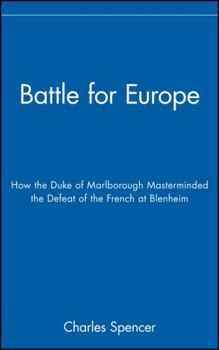Battle for Europe: How the Duke of Marlborough Masterminded the Defeat of France at Blenheim
Select Format
Select Condition 
Book Overview
A "wondrously enthralling" (The Times [London]) history of the bloody battle that halted the French attempt to dominate Europe and changed the course of history
In 1704, the armies of French King Louis XIV were poised to extend the French frontiers to the Rhine and install a French prince on the Spanish throne. But as French forces marched toward Vienna, allied armies commanded by John Churchill, Duke of Marlborough, and Prince Eugene of Savoy set out to oppose them. The two forces clashed at Blenheim, in Bavaria, and the previously undefeated French were routed, ending France's dream of European domination. Based on original sources, this page-turning narrative brings the battle to life, capturing the deliberations of kings as well as the experiences of ordinary soldiers.





